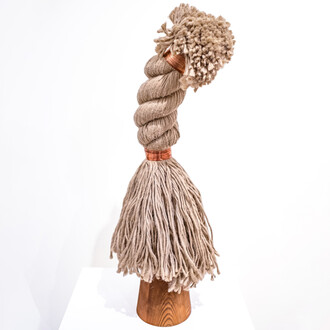From the great manuscript libraries of the early Middle Ages, through to colonialism and independence right up to the writers and artists working in the present day, West Africa has a powerful literary, artistic and musical heritage.
West Africa: Word, Symbol , Song, a major new exhibition opening at the British Library this week, will trace a thousand years of this history, drawing on over 200 stunning manuscripts, books, sound and film recordings as well as artworks, masks and colourful textiles from the British Library’s vast African collections and beyond.
From centuries-old drum language, to protest songs, to illuminated religious manuscripts and a range of objects and textiles indicating proverbs and symbolic meanings, the exhibition will offer an insight into the centuries-old written heritage, as well as the ancient oral traditions of West Africa, both of which continue to influence and inspire in the present day.
Told through unique texts, recordings and manuscripts of the time, West Africa: Word, Symbol , Song will explore how key figures in West African history have harnessed the power of words to build societies, drive change and fight injustice, from the Nobel prize-winning Nigerian author Professor Wole Soyinka, to the creator of Afrobeat and human rights activist Fela Kuti, to a generation of enslaved West Africans who agitated for the abolition of the slave trade in the 18th century.
Key items on display in the exhibition will be:
A room dedicated to the music and activism of Fela Kuti, including a letter written by Kuti to the then president of Nigeria, General Ibrahim Babangida in 1989, agitating for political change
Ghanaian brass weights used to weigh gold dust, an exquisite brass decorative box, and a range of ‘fancy print’ cloths, all used to carry messages, proverbs and symbolic meanings
A pair of atumpan ‘talking drums’ akin to those still used in Ghana today, and a musical instrument from The Gambia called the akonting, thought to be a predecessor of the banjo
Letters, texts and life accounts written by Olaudah Equiano, the most famous 18th century British writer of African heritage, the enslaved and freed scholar Ayuba Suleiman Diallo, Ignatius Sancho, who was born on a slave ship and went on to become an influential intellectual figure, and Phillis Wheatley, who was enslaved as a child and went on to write Romantic poetry
A striking carnival costume newly designed by Brixton-based artist Ray Mahabir, based on the tradition of Bele, a drum dance and song closely linked to Caribbean history, struggle, freedom and celebration
Textiles and music dedicated to Chinua Achebe, and an annotated typewritten script by the Nobel prize-winning author Wole Soyinka, alongside works by new writers including Chimamanda Ngozi Adichie,and Sefi Atta
Marion Wallace, Curator of African Studies and Janet Topp Fargion, Curator of World and Traditional Music, who co-curated the exhibition, commented:
“Africa is often thought of as the continent of the voice, dominated by oral history and traditions. With the British Library’s West Africa: Word Symbol, Song exhibition, we want to expand this view and celebrate the writing, literature and music from this hugely creative and dynamic region, grounding the story in a millennium of history and bringing it right up to the present.
We have consulted many sources to develop this exhibition, from the British Library’s own exceptional collections relating to Africa, to the voices of a broad range of people with expertise in and links to West Africa and the Caribbean, and we look forward to welcoming visitors to the Library this Autumn to discover this fascinating story for themselves.”
Dr Gus Casely-Hayford, exhibition advisor, said:
“This important exhibition exploring West African intellectual tradition is like a breath of fresh air, a long overdue chance to at last see the continent's achievements clearly, free of ethnographic weight, given coherence through simple chronology and love of the subject. In West Africa: Word, Symbol, Song the British Library offers us an insight into some of the most exquisitely beautiful and intellectually ambitious cultures the world has known. This is a region of both deep artistic sophistication and intense academic accomplishment - and this is a chance to follow its development across a thrilling millennium of achievement.”
The exhibition will be accompanied by a major series of talks, events and performances, including:
A ‘Late at the Library: Felebration’ event celebrating the music of Fela Kuti, ‘Art and Afrobeat’ with Lemi Ghariokwu, the Nigerian artist and graphic designer renowned for creating the artwork for Fela Kuti’s classic albums, and a screening of ‘Finding Fela’, a documentary of the life of Fela Kuti
A season of contemporary and classic West African cinema, in partnership with Film Africa
A special MOBO edition of the Library’s ‘Inspiring Entrepreneurs’ season featuring Kanya King, CEO and founder of MOBO, Jude Sarpong, Levi Roots and
An African Market and Discovery Day of hands-on workshops, demonstrations, stalls and performances for families



















